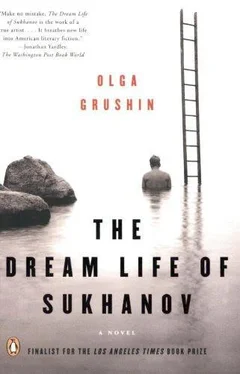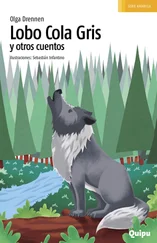Sukhanov rolled back his shoulders, exhaled, and climbing out of the car, told Vadim to return tomorrow, around three or four in the afternoon. Then, as the Volga lumbered back to the road, he pushed open the gate in a tall wooden fence and, chased by the frenzied barking of Coco, the neighbor’s fat, asthmatic poodle, walked down the winding path.
Here, in the countryside, the summer still lingered as if charmed. A rich smell of cut grass rose into the air along with a midday chorus of somnolent crickets; bumblebees hovered with contented weightiness under a sky blue as the brightest faience; orchard trees rippled in the breeze, revealing flashes of the light green of Antonovka apples among the dark green of restless leaves. On both sides of the path, tumbling branches of blossoming wild roses, red and white, rained petals onto his feet, and their sweet, heavy scent unexpectedly summoned to his memory a delightful tea Valya had occasionally brewed from rose hips. In a few more strides, the white stone walls of the house gleamed through sun-dappled branches of a young oak, reminding him of some impressionist study of color and light. Swinging his bag back and forth like an impatient child, he ran up the steps.
The front door stood ajar; he walked inside. He saw her right away. Sitting by an open window on a glassed-in veranda, she leafed through an art book and picked plums from a ceramic bowl before her; a pile of pits glistened on a saucer at her elbow. The mellow afternoon light that filtered into the room through the gently swaying reddening ivy imparted to her skin the golden glow of a Vermeer portrait.
At the sound of his rushed steps, she looked up, and he saw a slight wrinkle form momentarily between her eyebrows, then vanish just as quickly.
“Tolya,” she said, rising. She was dressed in a loose shirt and an old ankle-length skirt, black with rows of bright little cherries, which she wore only when puttering about her small vegetable garden behind the house.
“You seem unwell,” she said, coming closer. “Are you feeling all right?”
She did not smile, but everything about her—her words, her movements, the tone of her voice—was comforting, tender, softly colored, and he had to fight the urge to weep with relief.
“I… I don’t know,” he said. “I guess I have a headache. It’s not important.”
She put her cool hand on his forehead; her fingertips smelled of fruits and earth.
“No, you don’t feel hot,” she said, taking her hand away. “Come, I was just about to make tea. I have some wonderful apple pie, Katya brought it over this morning. There are some leftovers from yesterday too, if you are hungry.”
Realizing that he was indeed famished, he followed her inside the sunlit house. As they drank their tea, she spoke, leisurely yet with a touch of uncharacteristic animation, about the surprising harvest of plums, the late blooming of roses, a tame wagtail that visited her on the terrace every morning…. He found himself silently watching her lips shape the words. He had planned to tell her about the rift with Dalevich, the loss of his position, the trouble with Ksenya—had, in fact, spent most of the morning rehearsing the half-indignant, half-pained expressions in which he would couch all his sufferings. Yet now, as he listened to her meandering stories, originating in a reality so different from his own and released lightly, almost lovingly, into this glowing afternoon lull, he felt his need for her pity fading away along with the last complaints of his hunger. And all at once his presence here, conceived and executed with such proprietary ease, and accepted by Nina with such unquestioning simplicity, produced in him a deliciously light-headed sensation of being freed—being rescued—from the whole of his recent existence. He felt astonished that this verdant, warm, rustic world existed not one hundred kilometers from his dark, tormented Moscow universe; and slowly, indulgently, gratefully, he allowed himself to enter the unlikely new life Nina was describing, or possibly creating, before his eyes—a life whose essence lay in the prolonged note of a bird singing in a tree, the hesitant flight of a butterfly alighting for a moment on a windowsill, its velvety brown wings closing and opening in a rhythm of deep, sleepy breathing, and the flickering advance of a dappled, aromatic shadow across a beautiful woman’s face….
Later she took him into the garden. Together they wandered the paths twisting among flower beds and vegetable plots and gooseberry bushes. She showed him her flaming yellow and orange marigolds, a pile of twigs in a hollow behind the toolshed where two days earlier she had glimpsed an old hedgehog, and the lacquered leaves of a rare tea rose about to bloom. He walked a step behind, nodding at the unfamiliar names of plants and weeds, feeling somehow attuned to every tentative shift in the universe—the gradual cooling of grasses, an early hint of vespertine dampness creeping through the air, the measured flow of time itself, its colors changing from the swaying green-gold of the breezy, leafy afternoon to the translucent lavender-silver of the cool, misty evening. A few houses away, someone had started a fire; a thin rivulet of smoke rose above a neighbor’s roof, and the smell of burning leaves made the air tingle.
He stopped, breathed in deeply.
“Why don’t we gather some branches and have a fire of our own?” he said then. “It will probably be cold enough for the fireplace.”
“That sounds nice,” she replied. “I think there is a bottle of red in the pantry.”
The pleasingly chilly night was already pressing against the windows when he finally managed to start a good fire, fed by a three-year-old issue of Ogonyok. The contours of the room disappeared into wavering shadows, and darkly glowing crumbs of the disintegrating pages threw dull reflections into Nina’s pale eyes as she sat staring into the flames, her wine neglected.
He watched her over the rim of his glass, then asked, “What are you thinking about, my love?”
She shrugged, not moving her eyes from the fire.
“There is an artist, I forget her name,” she said. “She makes these cubes. They look like children’s toy blocks, only they are upholstered in fabric, and they have texts on them—short poems, cryptic statements, that kind of thing. And sometimes a bigger cube might open up to reveal a different-colored smaller cube inside, and it might say something too, like an answer to a question posed on the outside.”
“Where have you seen them?” he asked in mild surprise.
“An exhibit I went to recently. Anyway, there was this one cube. Its fabric was ugly, black with purple flowers, like an old woman’s dress or a ribbon on a funerary wreath, and its label read, ‘A soul.’ Underneath, there was a warning: ‘Don’t open or it will fly away.’”
“And?” Sukhanov said after a pause.
“And nothing. The lid wouldn’t open, it was glued shut. But I can’t stop thinking about what might have been hidden inside. Would there be another dark cube that said, ‘Too late, it’s gone, told you not to open it’? Or was there instead a bright red or blue cube, or one wrapped in golden foil, perhaps, that said, ‘The daring are rewarded. Take your soul, go out into the world, and do great deeds’?”
“Most likely there was nothing inside,” he said, refilling his glass. “Why bother creating something if no one will see it? These kinds of trifles aren’t real art, anyway.”
“It’s just that I can’t stop thinking about it,” she replied.
For a while after that, they sat in silence. The wine tasted of youth and sun; in the fireplace, hidden moisture hissed within slender aspen branches; two rooms away, in the kitchen, the cuckoo in the old clock reluctantly coughed eight times. Beyond the window, Sukhanov imagined he could see the glint of stars circling unhurriedly through the skies.
Читать дальше








![Theresa Cheung - The Dream Dictionary from A to Z [Revised edition] - The Ultimate A–Z to Interpret the Secrets of Your Dreams](/books/692092/theresa-cheung-the-dream-dictionary-from-a-to-z-r-thumb.webp)



